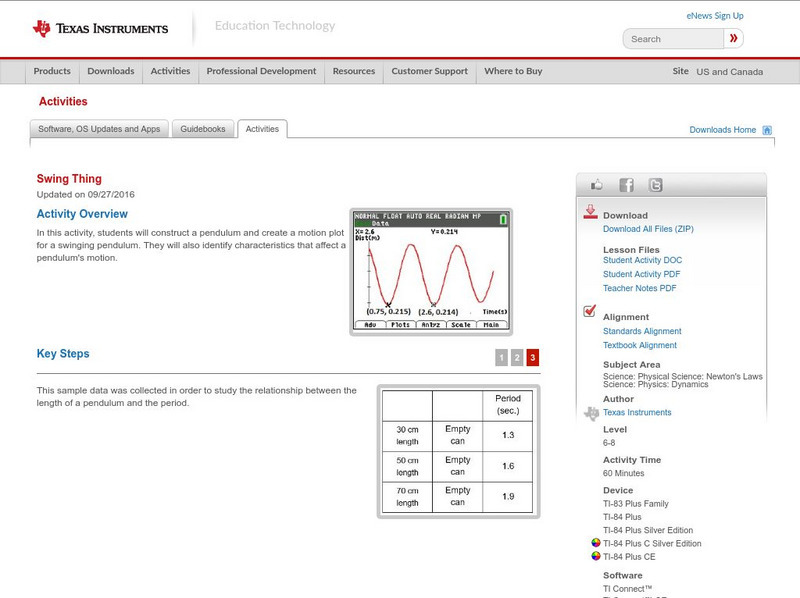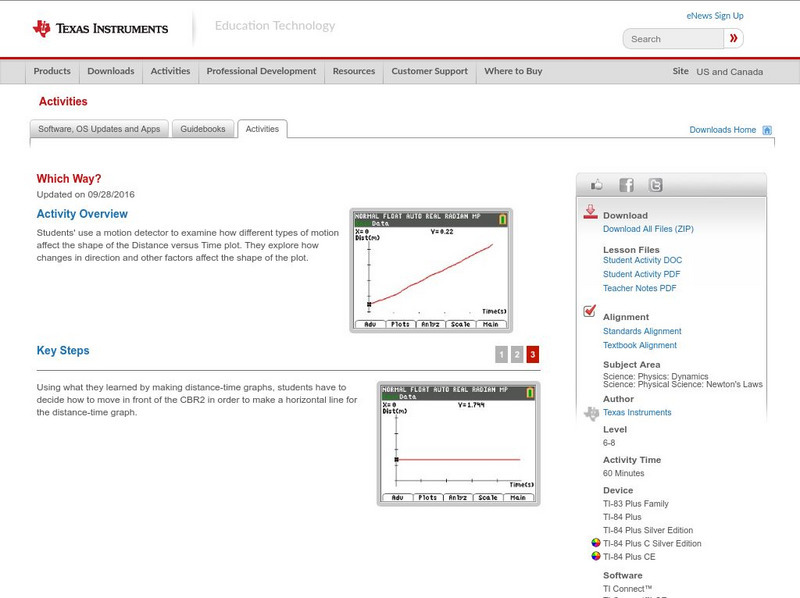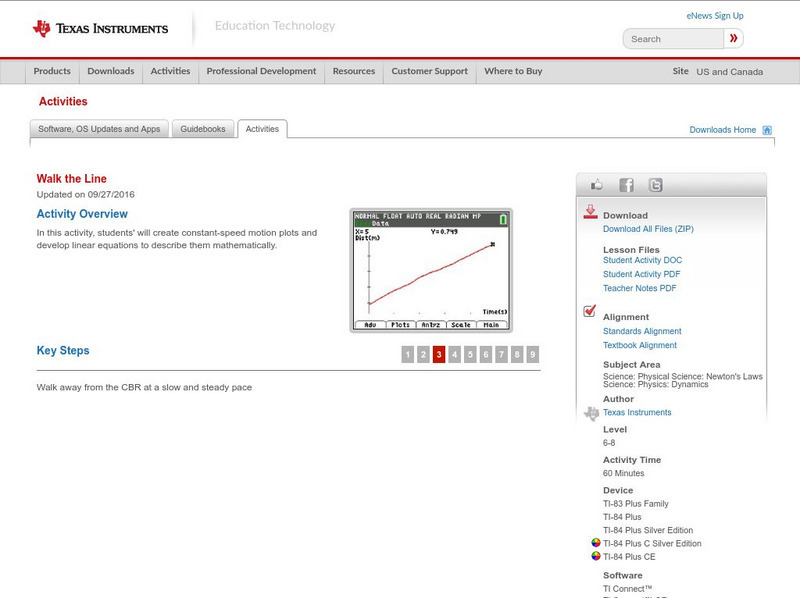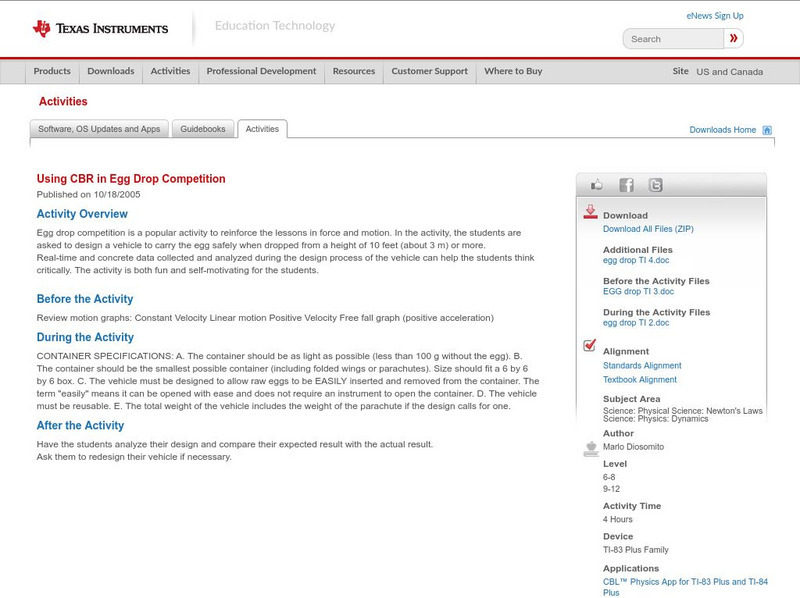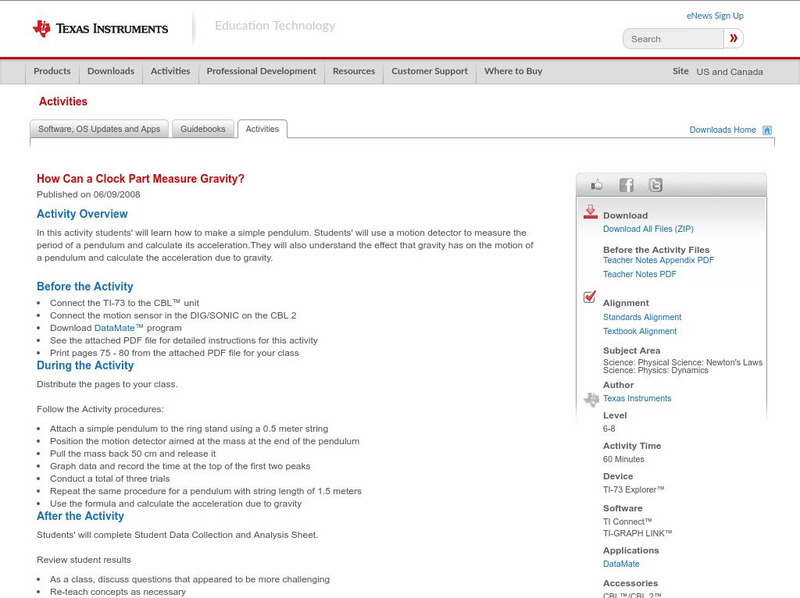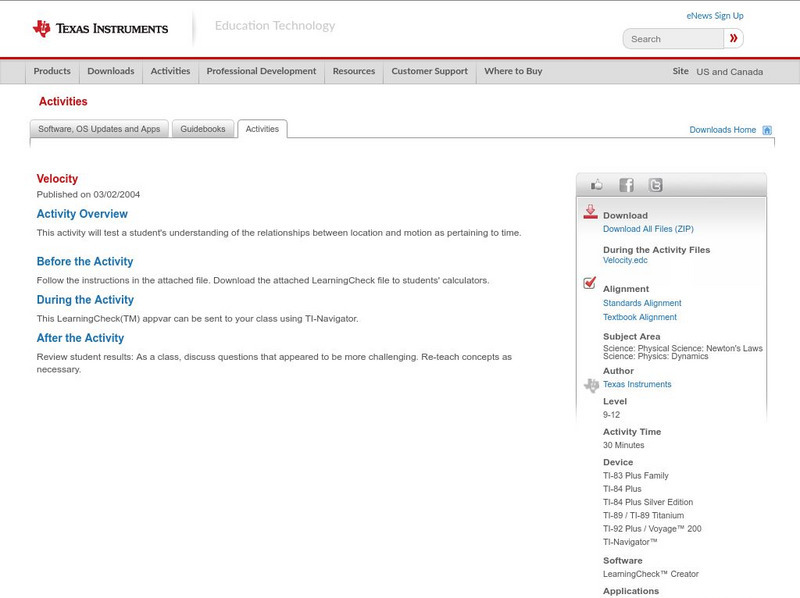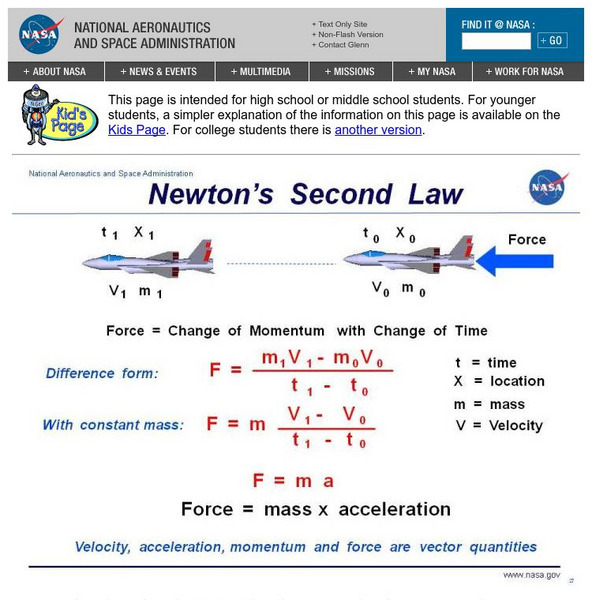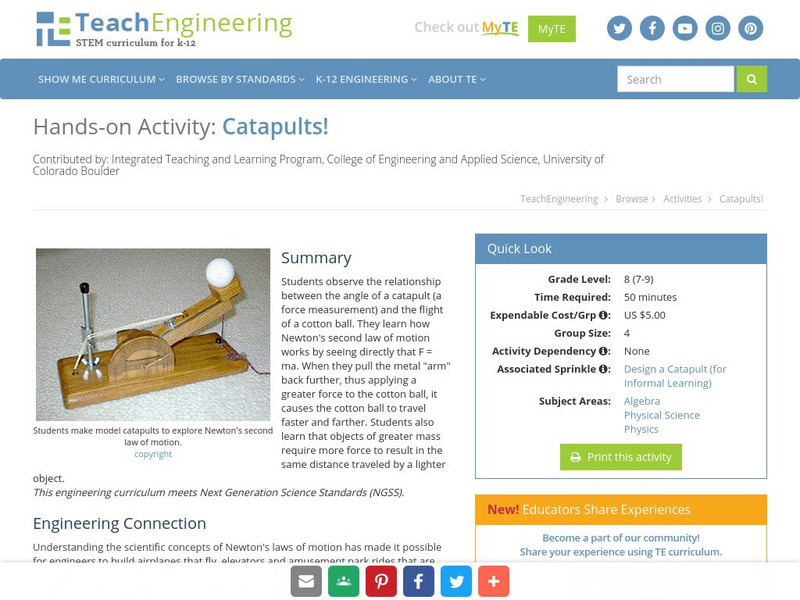Hi, what do you want to do?
Texas Instruments
Texas Instruments: Swing Thing
In this activity, students will construct a pendulum and create a motion plot for a swinging pendulum. They will also identify characteristics that affect a pendulum's motion.
Texas Instruments
Texas Instruments: Shape Up!
In this activity, students can use the motion detector to record motion, and observe how the direction of movement, speed of travel, and the rate of change of direction and speed affect the shape of a distance-time plot.
Texas Instruments
Texas Instruments: Match Me!
In this activity, students move in a specific way in front of the motion detector to create motion plots that match a given Distance versus Time plot. They make connections between types of movements and characteristics of Distance-Time...
TeachEngineering
Teach Engineering: Red Light, Green Light
Building upon their understanding of forces and Newton's laws of motion, students learn about the force of friction, specifically with respect to cars. They explore the friction between tires and the road to learn how it affects the...
CK-12 Foundation
Ck 12: Fifth Grade Science: Earth Science: Gravity
Do you know how gravity affects you? This module defines gravity and explains how gravity affects the motion of objects.
Texas Instruments
Texas Instruments: Which Way?
Students' use a motion detector to examine how different types of motion affect the shape of the distance versus time plot. They explore how changes in direction and other factors affect the shape of the plot.
Massachusetts Institute of Technology
Mit: Open Course Ware: Angular Momentum and Conservation
Students explore angular momentum and conservation. Some topics examined in the activities are angular momentum, torque, and conservation. The resource consists of video clips, lecture notes, practice problems, and exam questions....
Texas Instruments
Texas Instruments: Slow Down: Speed Up
In this activity, students' will use a motion detector to observe the effect of speeding up, slowing down, and moving at a constant rate on a Distance versus Time plot.
Texas Instruments
Texas Instruments: Walk the Line
In this activity, students will create constant-speed motion plots and develop linear equations to describe them mathematically.
Texas Instruments
Texas Instruments: Using Cbr in Egg Drop Competition
Egg drop competition is a popular activity to reinforce the lessons in force and motion. In the activity, the students are asked to design a vehicle to carry the egg safely when dropped from a height of 10 feet (about 3 m) or more....
Texas Instruments
Texas Instruments: Falling Objects
In this activity, Students can use a Motion Detector to measure distance and velocity.
Texas Instruments
Texas Instruments: How Can a Clock Part Measure Gravity?
In this activity students will learn how to make a simple pendulum. Students' will use a motion detector to measure the period of a pendulum and calculate its acceleration.They will also understand the effect that gravity has on the...
Texas Instruments
Texas Instruments: Velocity
This activity will test a student's understanding of the relationships between location and motion as pertaining to time.
Texas Instruments
Texas Instruments: What's Your Speed?
In this activity, students' will use a motion detector to determine what effect the speed at which a person moves has on the appearance of the distance versus time plot.
NASA
Nasa: Beginner's Guide to Aerodynamics
This site from NASA provides a graphic depicting Newton's second law. Graphic is accompanied by an explanation. Part of a larger site with additional information on Newton's laws.
Ducksters
Ducksters: Biography for Kids: Scientist: Isaac Newton
Investigate Isaac Newton's biography on this site. Learn how he was a scientist who discovered gravity, the three laws of motion, and calculus. He is considered one of the great scientists in history.
ClassFlow
Class Flow: Forces in Action
[Free Registration/Login Required] This flipchart explains weight and gravity and engages students in activities using force and motion.
TeachEngineering
Teach Engineering: Physics Tug of War
In this activity, students will learn about Newton's 2nd Law of Motion. They will learn that the force required to move a book is proportional to the weight of the book. Engineers use this relationship to determine how much force they...
Other
Wikibooks: Physics Study Guide
A handy resource that gives an overview of equations and definitions pertinent to an introductory, college-level physics course, with two of its three sections focusing on motion-related topics and principles.
Museum of Science
Museum of Science and Industry Chicago: Online Science: Drop Eggs Into Cups
Step-by-step illustrated instructions showing how to drop four eggs into four cups without touching them. Demonstrates the concept of inertia according to Newton's first law of motion.
TeachEngineering
Teach Engineering: Catapults!
Students observe the relationship between the angle of a catapult (a force measurement) and the flight of a cotton ball. They learn how Newton's second law of motion works by seeing directly that F = ma. When they pull the metal "arm"...
TeachEngineering
Teach Engineering: You're a Pushover!
The purpose of this activity is to demonstrate Newton's 3rd Law of Motion, which is the physical law that governs thrust in aircraft. The students will do several activities that show that for every action there is an equal and opposite...
Libre Text
Libre Text: Pressure Gradients
From high school geography class, you may remember that "air tends to flow from high pressure to low pressure". To understand why this happens, it is key to realizing that gasses (but also liquids) exert a force on their surroundings...
CK-12 Foundation
Ck 12: Physics Simulation: Pirate Ship
[Free Registration/Login Required] Learn about Newton's 3rd Law, and how the concept of the 'force pair' allows us to understand interactions between objects using this interactive simulation. A PDF worksheet and a video tutorial are...
Other popular searches
- Motion Newtons Laws
- Physics Newtons Laws of Motion
- Newtons Laws of Motion Sports
- Motion and Newton's Law
- Physics Newtons Laws Motion





